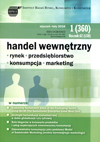Slow Food w gastronomii w kontekście zrównoważonego rozwoju
Slow Food in Catering in the Context of Sustainable Development
Author(s): Dagmara StangierskaSubject(s): Business Economy / Management, Micro-Economics, Marketing / Advertising
Published by: Instytut Badań Rynku, Konsumpcji i Koniunktur
Keywords: slow food; sustainable development; catering services;
Summary/Abstract: The problems undertaken in the article concern one of the forms of implementation of the idea of sustainable development, which is the movement named Slow Food. In her article, the author presented in details the many-sidedness of the Slow Food initiative as well as its implementation in the market for catering services, with a particular consideration of the activities carried out in Poland. For the purposes of this article, the author carried out a comparative analysis of eating places with the recommendation of the Red Snail sign on the grounds of information available on the restaurants’ Internet sites. In the evaluation of premises, there were taken into account the following criteria: mission and vision, culinary offer, prices of dishes, suppliers and raw materials. All Polish restaurants recommended by Slow Food can be included in the premium restaurant sector. The dominating type of culinary offer is Polish, international cuisine as well as fusion with an emphasis on the Polish cuisine, and the common element is reference to the use of local products. The Slow Food idea is a part of the stream of sustainable development; however, the specificity of the premises recommended by the movement in Poland is primarily of the marketing and not ideological nature. At the same toe, it is proper to emphasise that among merely eight premises with the Slow Food logo, two fully implement the movement’s agenda, emphasising its regionally sovereign and traditional character of the culinary offer.
Journal: Handel Wewnętrzny
- Issue Year: 360/2016
- Issue No: 1
- Page Range: 122-132
- Page Count: 11
- Language: Polish

